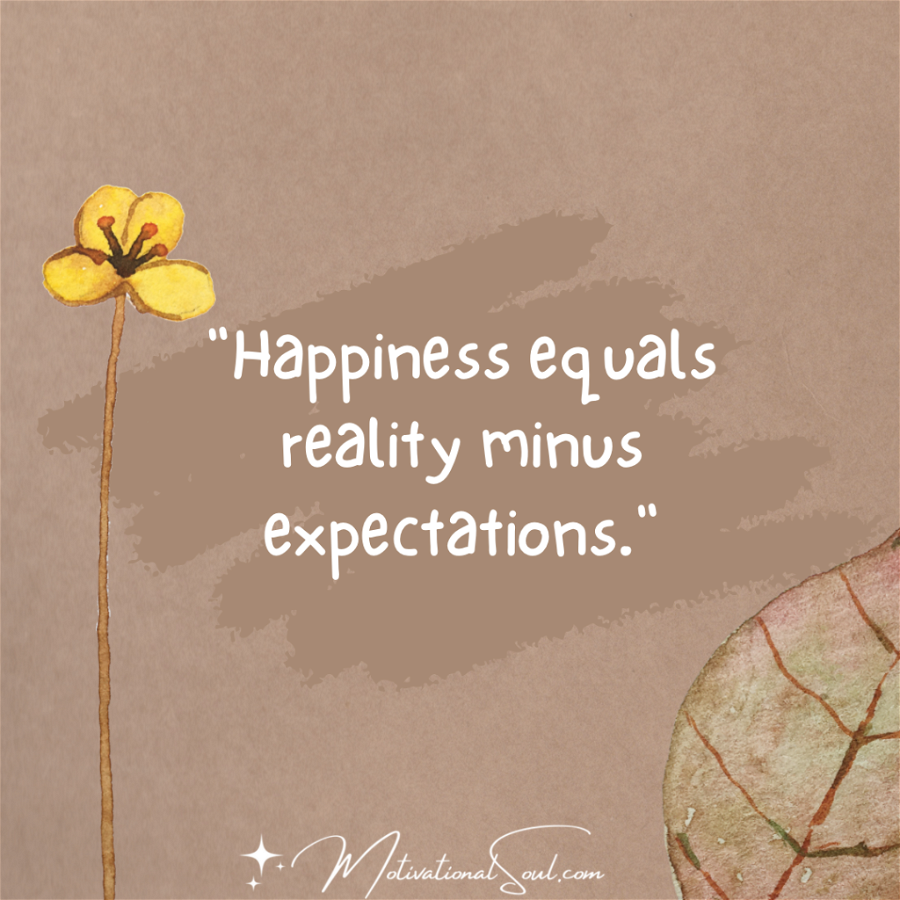Why Having High Expectations Can be Dangerous

We often hear advice that we should never expect and never be disappointed. But what does that mean for our mental health? In this blog post, we explore the meaning of this advice and how it can be applied to our lives. We discuss the importance of not setting ourselves up for disappointment and explore why expectations can lead to feelings of unhappiness. We also offer some tips on how to deal with disappointment when it arises.
When we set our expectations too high, we are more likely to be disappointed when things don’t go as planned. And, when we’re disappointed, we may start to feel negative emotions like sadness, anxiety, or stress. These feelings can impact our mental health, making us more susceptible to depression and other mental health disorders. So, we must learn how to manage our expectations and deal with disappointment healthily. Here are some tips:
1. Don’t Set Yourself Up for Disappointment: Disappointment is a negative emotion that we feel when our expectations are not met. We can avoid feeling disappointed by setting realistic expectations for ourselves and others. Realistic expectations are based on knowledge and experience, rather than hope or wishful thinking. When we set realistic expectations, we are more likely to achieve our goals, and we are less likely to be disappointed with the outcome. If we set unrealistic expectations, we are more likely to be disappointed, and our feelings of disappointment may prevent us from trying again in the future.
Therefore, it is important to take a moment to assess our expectations before taking action. If our expectations are realistic, we are more likely to achieve our desired outcome. If our expectations are unrealistic, we may need to adjust them accordingly in order to avoid disappointment.

2. Accept That Things Won’t Always Go as Planned: Disappointment is a feeling we all experience from time to time. Things don’t always go the way we want them to, and that’s okay. It’s normal to feel disappointed when things don’t go as planned, but it’s important not to dwell on it. Accept that things didn’t go the way you wanted them to and move on. Don’t let disappointment take over your emotions and ruin your day. Instead, focus on the positive and be grateful for what you do have.
Remember that everyone experiences disappointment sometimes, and it’s nothing to be ashamed of. Embrace it, learn from it, and move on.
3. Talk About Your Feelings: Disappointment is a normal emotion that everyone experiences from time to time. The important thing is not to dwell on the fact that things didn’t go the way you wanted them to. Accepting that things didn’t go as planned can help you move on. If you’re feeling disappointed, talk to someone about it.
Venting can help you feel better and may prevent you from holding in your feelings, which can lead to Mental Health problems like depression and anxiety. It’s okay to feel disappointed when things don’t go as expected. Just remember to accept it and move on.
4. Be Willing to Forgive: Disappointment is a feeling we all experience at one time or another. It can be caused by unmet expectations, unfulfilled desires, or simply a situation that didn’t turn out the way we’d hoped. Whatever the cause, it’s important to remember that everyone experiences disappointment from time to time. Try to see things from the other person’s perspective and be willing to forgive them. Holding a grudge will only make you feel resentful and angry. So let go of any negative feelings and move on.

5. Focus on the Positive: Disappointment is a feeling we all experience at one time or another. Whether it’s being passed over for a job, not getting into the college of our choice, or having a relationship end, disappointment can leave us feeling angry, hopeless, and heartbroken. However, it’s important to remember that Disappointment is only a feeling – it’s not reality. Disappointment occurs when our expectations are not met. We expected to get a job/get into college/have a relationship, but things didn’t turn out the way we wanted. It’s important to realize that just because we’re disappointed doesn’t mean that we’re failures. Disappointment is painful, but if we allow ourselves to feel the pain and then let it go, we can move on and focus on the positive aspects of our lives.
Try to forgive yourself for being disappointed and focus on all the other jobs/colleges/relationships that are out there waiting for you. Focusing on the positive will help you feel more hopeful about the future.

6. Find healthy ways to cope with disappointment: Disappointment is a feeling we all experience from time to time. Whether it’s because we didn’t get the promotion we were hoping for, or our favorite team lost the big game, disappointment can leave us feeling frustrated, sad, and even helpless. While it’s normal to feel disappointed when things don’t go our way, it’s important to find healthy ways to cope with this emotion. Otherwise, we may find ourselves struggling with depression or other mental health issues.
One healthy way to deal with disappointment is to exercise. Exercise releases endorphins, which have mood-boosting effects. So even if you don’t feel like working out at first, you may find that after a few minutes you’re feeling better. Journaling is another healthy coping mechanism for disappointment. Writing down your thoughts and feelings can help you to process them in a constructive way.
And finally, talking to a friend or therapist can also be helpful. Talking about our disappointments can help us to see them in a different light and figure out what steps we need to take to move on.

7. Allow yourself to feel disappointed: Disappointment is a feeling we all experience from time to time. Whether it’s because we didn’t get the job we wanted, our favorite team lost the big game, or we didn’t get the grade we were hoping for, disappointment can leave us feeling sad, angry, or even hopeless. While it’s perfectly normal to feel disappointed when things don’t go our way, it’s important not to dwell on those negative emotions for too long. Instead, try to take a step back and examine your expectations.
If you’re expecting perfection from yourself or others, you’re likely to be disappointed more often than not. Rather than setting yourself up for disappointment, try to focus on the good and be grateful for what you do have. When you start looking at the world through this lens, you may find that Disappointment becomes less and less common.

8. Communicate your expectations clearly: Disappointment often stems from false expectations. If you Communicate your expectations clearly, you can help to prevent misunderstandings and false expectations. Make sure that you are clear about what you expect from the situation, and be sure to communicate this to the other party involved. By setting clear expectations, you can avoid disappointment and help ensure that everyone is on the same page.

9. Don’t take things personally: Disappointment is a normal part of life. We all have expectations for how things will go, and sometimes those expectations are not met. When that happens, it’s important not to take things personally. Disappointment is often caused by factors outside of our control, such as the actions of other people. Instead of beating yourself up, try to remember that you did your best and let go of the outcome. It can also be helpful to talk to somebody else about what happened if you’re feeling upset.
Talking to a friend or family member can help you to see the situation in a different light and come up with a plan for how to move forward. Disappointments are inevitable, but how we deal with them is up to us. By keeping things in perspective and staying positive, we can minimize the impact that disappointment has on our lives.

10. Be realistic: Disappointment is often a result of unrealistic expectations. We expect people to be who we want them to be, and we expect things to happen the way we want them to. When they don’t, we feel angry and resentful. But if we can let go of our expectations and live in the present moment, we will be much happier.
Disappointment is a common emotion, but it doesn’t have to control our lives. By understanding where it comes from and how to deal with it, we can learn to let go of our unrealistic expectations and live more happily in the present moment. If you’re interested in learning more about how to improve your mental health, be sure to check out our blog for helpful tips and advice. Thanks for reading!




Recent Comments